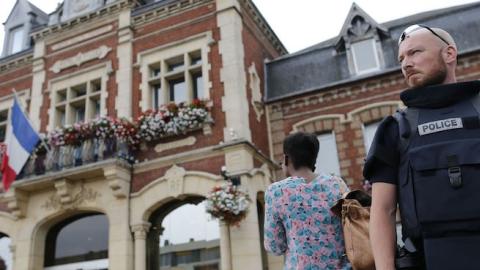In recent months, Islamist terrorists have brutalized France, horrifying the world with vicious, bloodthirsty murders and mutilations.
In Paris, an ISIS attack in November killed 129 innocents and injured 352.
In Nice, on Bastille Day, a truck driven by an ISIS sympathizer mowed down 84 holidaymakers and injured scores of others.
And now we learn of yet another vicious attack. Fox News reported on Tuesday,
“Two attackers slit the throat of an 84-year-old priest and critically injured at least one other person early Tuesday in a church near the Normandy city of Rouen before being shot and killed by police, a French security official said.
“The priest, identified by Sky News as Jacques Hamel, was dead at the scene, and another person, possibly a nun, was clinging to life, Interior Ministry spokesman Pierre-Henry Brandet said.”
French President Francois Hollande later announced that the two neutralized assailants had pledged their loyalty to ISIS.
This latest account shines much-needed illumination on an ugly and unexposed sequence of anti-Christian incidents.
On the part of authorities and the media, a persistent lack of attention obscures – perhaps intentionally – the loathing Islamist terrorists hold toward both Jews and Christians.
Thanks to the careful scrutiny of international Jewish publications, attacks by radical Islamists on French Jews and their businesses, synagogues and cemeteries are better known.
There have been innumerable such assaults; perhaps the most widely reported was on January 9, 2015 at Hyper Casher, a Kosher supermarket in Vincennes, where four hostages were murdered. Tablet Magazine listed 25 such incidents in 2014 alone; many more have taken place since.
In response, according to the Jewish Agency for Israel (JAFI), 10 percent of French Jewry has relocated to Israel since 2000.
Unfortunately, similar attacks on Christians are rarely recounted, although ISIS has made its intentions clear: “the Christian community… “will not have safety, even in your dreams, until you embrace Islam. We will conquer your Rome, break your crosses, and enslave your women….”
Certainly Islamist radicals have not ignored this proclamation, even though accounts of their successful efforts may be hard to come by.
Only a scouring of Catholic news reports exposes an ongoing litany of desecration, arson and abuse. For example, a recent newsletter from Federation for Europa Christiana recounts (in French) the following:
“At Martigues…three successive attacks in May 2016: first the pastor extinguished a malicious fire on the altar of the church of the Madeleine. This same priest was later attacked and his eye was blackened….
“Then, at the Saint-Genest church, the same priest discovered the open tabernacle and communion wafers thrown to the ground…
“In April, 2016, all the crucifixes and crosses were shattered at the cemetery of La Chapelle-du-Bard….”
All told, 810 attacks on French Christian places of worship and Christian cemeteries took place in 2015.
Meanwhile, the National Catholic Register reported on June 6,
“In recent weeks, Catholics in France and Belgium — countries still recovering from brutal ISIS attacks — have been hit with numerous acts of violence and aggression, including fires set in churches, an assault on a priest, the desecration of a tabernacle.
“More than 100 Catholic websites… of churches and congregations were hacked by suspected Tunisian cyber-jihadists who call themselves the Fallaga Team.”
Tuesday’s murder of an 84-year-old priest, the grave injuries to a nun, and the hostage-taking of Catholics attending Mass suggest an escalation of these shadowy activities.
For political and ideological reasons, whenever possible French politicians (along with many other European authorities) continue to downplay such attacks. In response, few major media sources bother to report them.
Nonetheless, as the jihadi saying goes, “First the Saturday People, then the Sunday People.” Islamist radicals consistently target Jews and Christians.
And, widely reported or not, the facts on the bloodied ground speak for themselves.

















